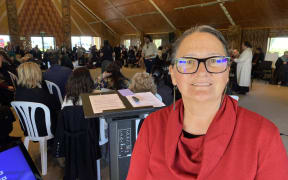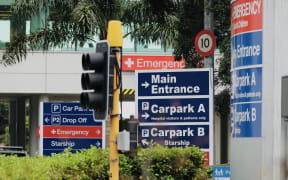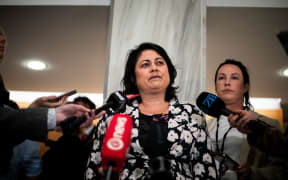A pathway into work in Canterbury's health system for Māori and Pasifika has been so successful, whānau and friends of participants are signing up to new intakes and it is being expanded across the country.
Whakamana Whānau aims to get people into non-clinical roles in the health workforce. It recently launched its next phase to progress kaimahi (staff) into clinical roles such as becoming registered nurses or technicians, by supporting them with their studies and training.
Mahora Tuki (Ngāti Maru, Tainui) was not sure what she wanted to do when she finished high school last year.
"I thought I wanted to try tourism, I thought I wanted to try lots of other stuff, but I didn't really think about healthcare. I thought it was quite hard and I didn't have any family members in it, so didn't know much about it and didn't think I could [do it]."
Then a career advisor suggested Te Whatu Ora Waitaha's Whakamana Whānau programme. Tuki gave it a go, starting off in a midwifery unit before switching to become a radiographic assistant.
"I've noticed I've become more extroverted, especially with the Whakamana Whānau backing me up. I've become a bit more confident knowing that there's some support behind me, so I can talk to them, get their support and have them help me."
Her sights were now set on a Bachelor of Medical Imaging.
Without the programme, Tara Saul said she would not have finished her studies to become an enrolled nurse.
"There were times where I was like, 'I can't. I can't finish my studies, I can't do this.' There were a lot of barriers because I've got dyslexia.
"But I kept fighting, kept pushing through, and with support from my whānau and my classmates and everyone, I did it."
This week, she will start her first shift on a Burwood Hospital ward - the same one she trained on.
Her experience sparked interest from whānau and friends.
"My brother is an orderly at Christchurch Hospital, which was a role he started in this year's programme. And he's loving it, he talks about it every day," Saul said.
Tuki's new job had a similar effect.
"My mum, she wanted to be a midwife before but she had four kids, so it was a bit hard," she said.
"She wants to apply as a ward clerk at the hospital, now that I work here, so hopefully we will have lunch dates together if she gets in."
Helen Tutengaehe (Ngāi Te Rangi, Ngāti Ranginui, Ngāti Pukenga) studied Māori health inequities before retraining in the healthcare space herself.
Whakamana Whānau encouraged her back as a kaiāwhina on a Christchurch Women's Hospital maternity ward.
"I always missed my time at the hospital. I love being here, I feel like it's where I needed to be.
"I had a few years' break then got an email one day saying, hey look, we've got this beautiful programme starting to get people working in the hospital again, and I just jumped at the opportunity. I think within an hour of getting the email, I had already RSVP'd that I was really keen to go, and yeah, just went from there."
It was the right time to keep learning too, with the big korowai of programme support wrapped around her shoulders, she said.
"I'm really wanting to get into paediatric nursing, so at this stage, I'm looking at going back to study part time as well as keeping my job here part time. It's been something I've been wanting to do for a long time… I'm really looking forward to it and I'm grateful to have the Whakamana Whānau around me as well."
Rebecca McCormick (Kāi Tahu, Kāti Māmoe, Ngāti Raukawa, Ngāti Toa, Ngāti Mūtunga, Ngāti Tama, Te Ati Awa, Moriori) is Te Whatu Ora Waitaha and Te Tai o Poutini's head of equity, diversity and inclusion.
The programme had been a success, she said.
"We have had three intakes in Waitaha, Canterbury, and we've appointed 80 kaimahi Māori and Pasifika into the workforce, with an outstanding retention rate of 93 percent. We've had one intake in Te Tai o Poutini, the West Coast, and we've appointed five healthcare assistants into roles."
It also won a national development award.
Whakamana Whānau was in the process of being expanded across the motu, said John Snook, Te Whatu Ora national director of workforce planning and development.
Ideally, they would like to see 200 to 300 people go through the course over the next two years, he said.
"What we know is our best workforce is our locally grown workforce. These people are already committed to the system, they're working in it now. And we're committed to them.
"This is a way we can work in partnership to grow them, their expertise and in return, make our health system more productive, which is ultimately what the community is demanding of us, and rightly so, I might add."
It had big benefits for patients too, said Te Whatu Ora - Waitaha Canterbury chief people officer Jo Domigan.
"Our patients will get a better service from our hospitals if they're well represented here. So it's really important for us that our kaimahi, our staff, match the patients that are within our services.
"At the moment, we know we've got about 12 percent Māori in Canterbury, and we've got about 5 percent of our workforce that identify as Māori. So we've got some ways to close the gaps so that we better match the population."
The next intake will begin on the West Coast this week.





